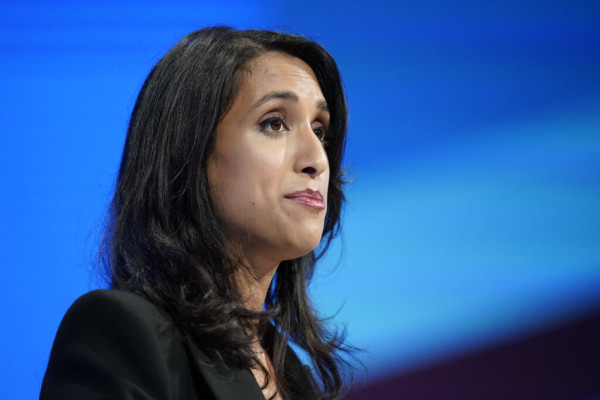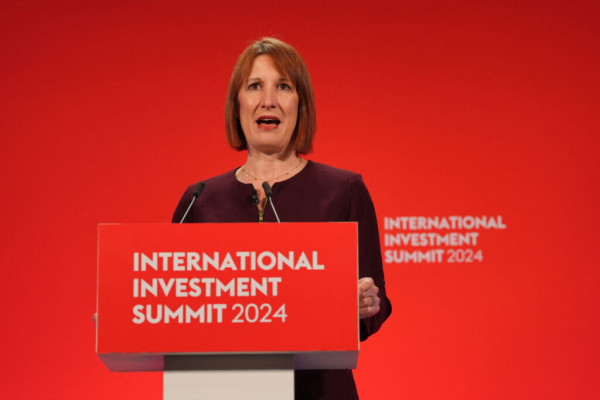No one has a plan to fix Britain’s old, cold homes
LONDON — It is, says one former U.K. energy minister, “the biggest problem” blocking the country's efforts to go green.
How do you kit out the U.K.'s millions of old, cold, drafty homes with better insulation and cleaner heating systems?
After years in government grappling with the same issue, Britain's Conservatives are now going on the attack — seizing on what they believe is a major political blindspot for Labour and accusing their opponents of a real lack of ambition as winter approaches.
It seems like an open goal at a time when Labour already faces voter fury for cutting social security payments meant to help pensioners cope with heating costs — but the problem runs far deeper, and implicates the Tories too.
One of the energy sector's most influential figures has already fired her own warning shot at new ministers. “We are very worried, and thinking about or interested in heat — and I haven't heard much from the new Labour government about heat at all,” Emma Pinchbeck, Energy UK boss and incoming chief executive of the Climate Change Committee, which scrutinizes government policy, said last month.
“They haven't said anything on it,” said Martin Callanan, a Conservative member of the House of Lords and, until July, an energy minister. “How you get to grips with home heating and small business heating, basically gas heating in the U.K., is the biggest problem [the government] face.”
Warning shots
The stakes couldn't be higher if Britain is serious about meeting its climate targets — and weaning itself off foreign energy imports.
Replacing old boilers with heat pumps, and cladding walls to stop heat escaping, are a “key component” of the U.K.'s drive to slash carbon emissions, government watchdog the National Audit Office said earlier this year.
Experts say Britain needs to make progress on the issue to protect U.K. energy security, too. “Insulation is now crucial to our energy independence, as we have to reduce gas demand to stop imports rising as the North Sea continues its inevitable decline,” said Jess Ralston, head of energy at the Energy and Climate Intelligence Unit think tank.
Yet the new government has a real job on its hands — and earlier attempts to drastically improve Britain's drafty homes hardly bode well for the future.
During the Tories' decade-and-a-half in power, they too struggled with home heating policies. They've been fighting about that failure in public since they left office.
The last government delayed a scheme meant to encourage manufacturers to phase out dirty gas boilers — the clean homes market mechanism (CHMM) — because it was something “Claire [Coutinho, the energy secretary] and Number 10 refused to get to grips with,” Callanan claimed. (Coutinho fired back in response that colleagues in her department backing the CHMM “couldn’t make the case for their position.”)

Coutinho did hike grants for homes to get them to switch to heat pumps, a move Labour's new ministers copied this month. The number of households using the scheme has been ticking up — but installations will need to grow eleven-fold by 2028 to hit government targets, according to the 2024 National Audit Office report.
Meanwhile, the Conservatives' major cladding program, the £1 billion Great British Insulation Scheme, is so far off track that analysts reckon it would take just shy of 150 years to hit its target.
“We do support moves to insulate homes better. It's absolutely one of the easiest ways that we can actually reduce our carbon emissions, ensure that we're not wasting heat being generated,” said Andrew Bowie, now a shadow energy minister after July's election ousted the Tories.
He insisted the previous government made “great strides” in improving home insulation — but could have gone “further and faster.”
“It's something that we struggled with throughout our time in government,” admitted Callanan. There simply weren't enough workers trained to fit insulation, he said.
Other shadow ministers identified problems communicating the schemes to the public to encourage uptake, too. “It basically came down to the fact that people didn't really understand” the help available, said MP Mark Garnier.
Over to Labour
Now all of this is Labour's problem — and experts already fear a lack of ambition.
The new government has already introduced “some helpful tweaks to existing schemes” for subsidizing heat pumps and insulation, Ralston said. But she warned: “There’s some doubt that this will be enough, and there are still policy options on the table.”
Labour has moved quickly on a series of headline-grabbing energy policy decisions, from green-lighting vast solar farms to setting up a state-owned clean energy firm, GB Energy. Yet Tory rivals aren't convinced it'll do much on the bread-and-butter problem of keeping people warm. “When you start pushing into the details of all of this stuff, actually it tends to fall a bit short,” Garnier said.
Labour ditched more ambitious home-heating plans before the election campaign even began, when it slashed its totemic green spending pledge. Yet it still entered government with a big promise: to spend over £6 billion upgrading five million homes in the next five years with new heat pumps and insulation.
But Chancellor Rachel Reeves — who has a government-wide budget looming later this month — has already started to row back on some financial commitments, claiming Labour has inherited a £22 billion "black hole" from the last administration.
The government insists all of this will be addressed in an upcoming "Warm Homes Plan."

Energy Minister Miatta Fahnbulleh told POLITICO this week: “The Warm Homes Plan, if we get it right, will be an ambitious program for how we get warmer, cleaner homes that are cheaper to run. It is a massive undertaking.”
Fahnbulleh told parliament last month that details on the plan will not be unveiled until after the spending review in the spring. When DESNZ last month announced the latest round of funding to insulate social housing, it admitted — in a sentence buried deep inside the documents — that the £1.2 billion committed to that fund by the last government was no longer guaranteed.
“I think they’d be mad not to continue with it,” said Callanan.
“They are now in government,” said Bowie. “It's up to them to develop the policies that are going to change the state of the situation in terms of home insulation.”
'Very poorest'
While the Conservatives gloat about Labour’s woes, the government faces pressure from its left flank, too.
Current home-heating policies are “lacking,” said Green MP and party co-leader Adrian Ramsay. Labour should be rolling out help which “touches every street in the country, which is what we need if everyone’s going to benefit from warmer homes and lower bills and decarbonizing heating,” he said.
Backbench Labour MPs, facing constituents spooked by still-rising energy bills, have also started to notice the hole in the government’s decarbonization plans.
“People across my constituency are worried about how they will afford to heat their homes this winter,” new Labour MP Laura Kyrke-Smith told parliament this week. “It is often the very poorest in our communities [who] are forced to live in those cold and drafty properties,” said another Labour backbencher elected this summer, Joe Morris.
Kyrke-Smith and Morris — naturally — point the finger firmly at the previous government. But in the meantime, Brits face another winter in cold — and carbon-intensive — homes.
“There are,” said Callanan, the former Tory energy minister, “no easy political answers.”